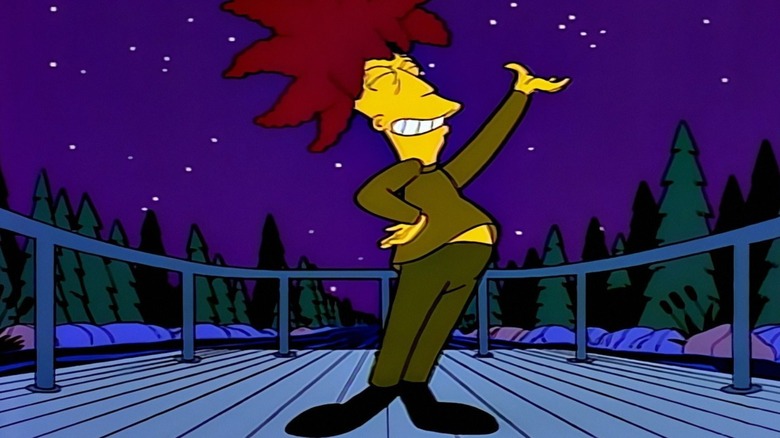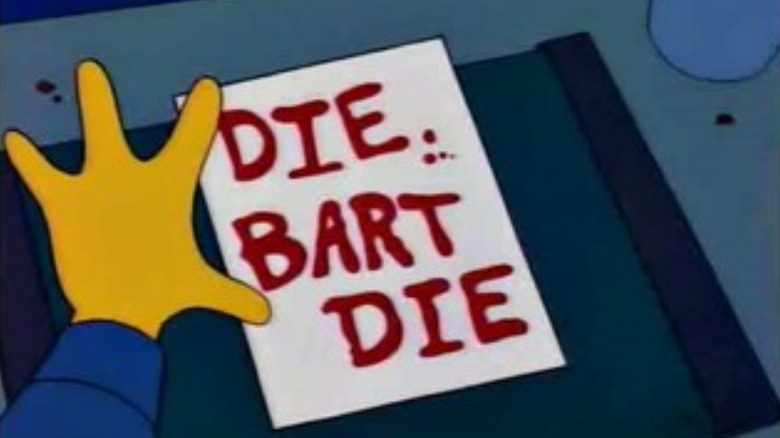One Classic Simpsons Episode Inspired A Postmodern Play (And Was Banned In Germany)
This post contains spoilers for "Mr. Burns, A Post-Electric Play."
"The Simpsons" has a wide-ranging cultural influence, but how many episodes of the long-running series can say they inspired an entire postmodern play? At least one: "Cape Feare," the classic season 5 outing in which Sideshow Bob (Kelsey Grammer) stalks Bart and forces the Simpsons family into witness protection.
Originally well-received, the episode has only grown in public estimation in the years since it aired, landing on many lists of the show's best episodes and earning an undeniable place in the hallowed halls of pop culture history. It's only fitting, then, that when playwright Anne Washburn decided to dream up a story about a post-apocalyptic world in which entertainment junkies clung to fragments of their favorite TV shows, putting them on as plays that would ultimately shape the mythology of the new world, "Cape Feare" took center stage. Washburn's thought-provoking postmodern play, "Mr. Burns, A Post-Electric Play," debuted in 2013, and its storyline quite literally turned "Cape Feare" into the stuff of legends.
As unusual as "Mr. Burns" is in both concept and execution, it uses "The Simpsons" as the starting point for incredible conversations about collective memory, inspiration, and the value of storytelling in an out-of-control world. In Act 1 of the play, recent apocalypse survivors try to self-soothe by remembering the plot of "Cape Feare," down to every joke and aside, around a campfire. Years later, Act 2 picks up when they've formed a theater troupe that trades bits of beloved TV episodes like currency, working together to recreate the scripts of their favorite shows based on their sometimes-fuzzy memories. Finally, 82 years after the world "ended," audiences are treated to a dramatic third act: a full performance of "Cape Feare," one that has morphed to fit the fears, values, and language of its time.
Mr. Burns, A Post-Electric Play tells an apocalypse story via The Simpsons
"Mr. Burns, A Post-Electric Play" has appeared on stages across the world and featured castmates including "Loki" star Wunmi Mosaku, "Our Flag Means Dead" actor Matthew Maher, and "Doctor Who" actor Annabel Scholey. In 2013, Washburn told Gothamist that she'd long-since had the idea to "take a TV show and push its past the apocalypse and see what happened to it." though she thought about using "Friends," "M*A*S*H," and "Cheers" before settling on "The Simpsons." The playwright penned the script for Act 1 through an unusual process involving the theater group she co-founded. "We stuck them in this bank vault for a week and we asked them to remember 'Simpsons' episodes," she recalled, "and the one they have the best memory of was 'Cape Feare.'" The script took shape based on the group's collective recollections.
So, why has "Cape Feare" struck generations of audiences as so memorable? For one thing, the Martin Scorsese parody is one of the scariest episodes of "The Simpsons" outside of the franchise's Halloween specials. An extended bit early on features Sideshow Bob writing multiple notes in blood, while characters cast heavy shadows and wield knives throughout, often for benign reasons that nonetheless terrify Bart. Lightning is laced through the background of the episode's climax, while Grammer performs his role with a delightfully chaotic sense of theatrics. By season 5, younger viewers knew to expect something creepy specifically from the show's "Treehouse of Horror" outings, but "Cape Feare" made a strong impression weeks before Halloween.
Cape Feare is one of the show's darkest and funniest chapters
Plus, the episode is memorably funny: the cops gamble on squirrels in their pants, Grandpa Simpson gets left at home when the group enters witness protection and ends up chased by wolves, and Bob's plan to catch Bart is interrupted by a series of increasingly painful misadventures — a field of cactuses, a pile of rakes, a parade of elephants — that feel like something out of an "Itchy and Scratchy" episode. In a DVD commentary (via Comic Book Resources), co-director Jon Vitti explained that the episode's boldness and sense of humor came from both the last hurrah attitude of original crew members who were about to leave the show, and from several bits that were added in to help the unusually short episode reach its target runtime.
"Cape Feare" was, at one point, even deemed too dark for certain audiences. For six years, the episode didn't air in Germany due to an opening scene featuring a man in Nazi-like attire. "The Simpsons" itself experimented with fan memory in a season 35 episode that revisited the "Cape Feare" plot, only this time, Bart actually got killed. The episode's potent mix of real thrills and extended comedic bits make it a great Rorschach test for how audiences feel about dark humor and the threat of death at any given moment, which in turn makes it a perfect fit for a play about processing the end of the world as we know it. Plus, that rake joke is just timeless.


